Filing a Divorce in Saudi Arabia | Best Divorce Laws Advisor in Saudi Arabia 2025
Divorce in Saudi Arabia is governed by Islamic law, specifically the Shariah, which outlines the legal procedures and rights associated with marriage dissolution. Saudi Arabia’s legal system heavily influences family matters, and divorce is no exception. For those considering or facing issues in Filing a Divorce in Saudi Arabia, understanding the country’s specific divorce laws is essential for navigating the legal complexities and ensuring that their rights are protected.
In Saudi Arabia, divorce can be initiated by either the husband or the wife, though the process may differ depending on the party filing and the grounds for divorce. In particular, the country’s legal framework focuses on providing a balanced approach to the dissolution of marriage, with an emphasis on fairness, protection of women’s rights, and ensuring the well-being of any children involved.
Navigating the divorce process can be overwhelming, especially when facing emotional and social pressures. By understanding the divorce laws and knowing the steps involved, individuals can take informed action to protect their interests. At Dr. Abdulrahman Baamir Law Firm, we specialize in providing expert legal assistance to clients seeking to file a divorce in Saudi Arabia. Our team of experienced family law attorneys is committed to ensuring a smooth and efficient divorce process, addressing all legal aspects of the case, and safeguarding your rights throughout the proceedings.
Legal Grounds for Filing a Divorce in Saudi Arabia
In Saudi Arabia, divorce is primarily governed by Islamic law (Sharia), which provides specific grounds and procedures for the dissolution of marriage. There are several legal grounds upon which a divorce may be filed, each of which may have different implications for both parties involved. Below, we explore the main grounds for filing a divorce in Saudi Arabia:

1. Mutual Consent Divorce
A mutual consent divorce occurs when both spouses agree to end their marriage voluntarily, without any dispute. This is often seen as the most straightforward and amicable form of divorce. The couple must reach an agreement on all aspects of the divorce, including the division of assets, custody of children, and financial support.
The mutual consent process typically involves:
- Negotiation: Both parties must come to an agreement regarding the divorce terms.
- Filing a Petition: The couple submits the divorce petition to the Saudi Family Court, where the court will review the case.
- Court Approval: The court may require mediation or counseling before finalizing the divorce.
2. Fault-based Divorce
A fault-based divorce occurs when one spouse is deemed to be at fault for the breakdown of the marriage. There are several grounds under which a divorce can be filed based on fault:
- Neglect or Abuse: If one spouse fails to fulfill their marital duties, such as providing financial support, or if there is physical or emotional abuse, the other party may file for divorce on the grounds of neglect or abuse.
- Incompatibility or Infidelity: If one spouse is found to be involved in infidelity, or if there is a significant incompatibility between the partners, the affected party may file for divorce.
- Failure to Maintain the Marriage: This includes issues such as failure to provide for the wife financially or emotionally, or the husband’s inability to fulfill marital responsibilities.
- Desertion: If one spouse leaves the other without a legitimate reason, this may be considered a valid ground for divorce.
In such cases, the spouse filing for divorce must present evidence of the alleged fault to the court, which will then assess the validity of the claim.
3. Other Grounds for Divorce
In addition to mutual consent and fault-based grounds, there are other circumstances that may lead to a divorce in Saudi Arabia:
- Separation for Extended Periods: If the couple has been separated for a prolonged period of time, and it is clear that reconciliation is not possible, a divorce may be granted.
- Mental Health Issues or Inability to Have Children: If one spouse has a severe mental illness or is unable to have children, the other spouse may file for divorce. In such cases, the spouse may be entitled to financial compensation or alimony.
- Inability to Provide Support: If a husband is unable to provide the necessary financial support for his wife and family, the wife may petition for a divorce on the grounds of financial neglect.
Filing a divorce based on these grounds requires clear evidence, and the court will typically assess whether the grounds are justifiable under Sharia law. When filing a divorce in Saudi Arabia, it is critical to understand the various grounds under which a divorce may be granted. Each case is unique, and the legal process can be complex, requiring a thorough understanding of the law. If you are considering filing for divorce, seeking legal counsel is essential to ensure that your rights are protected throughout the process.
Steps for Filing a Divorce in Saudi Arabia
Filing for divorce in Saudi Arabia involves a series of legal steps that must be followed carefully to ensure a smooth process. Whether you are pursuing a mutual consent divorce or filing on fault-based grounds, understanding the required steps is crucial. Below, we outline the essential steps involved in filing a divorce in Saudi Arabia:

1. Initiating the Divorce Process
The divorce process begins with one or both spouses deciding to end their marriage. It is essential to determine the grounds for the divorce, whether based on mutual consent or fault. Once the decision is made, the following steps can be initiated:
- Consult a Lawyer: It is recommended to consult with a lawyer specializing in Saudi family law before taking any further action. An experienced lawyer can help clarify your legal rights and advise you on the best course of action.
- Mediation (Optional but Recommended): In Saudi Arabia, the courts often encourage mediation before proceeding with a formal divorce. This step is designed to encourage reconciliation and may involve counseling sessions, especially in cases of mutual consent.
2. Filing the Divorce Petition
Once the decision is made, the next step is to file the divorce petition with the Saudi Family Court. The petition will detail the grounds for the divorce, such as mutual consent or fault-based reasons.
- Submission to the Family Court: The divorce petition must be submitted to the relevant family court in Saudi Arabia, either by the husband or wife, depending on who is initiating the process.
- Document Requirements: You will need to provide supporting documentation for the divorce, such as your marriage certificate, identification documents, proof of any allegations (in case of fault-based divorce), and any other relevant evidence.
3. Court Hearings and Mediation
Once the petition is filed, the court will schedule hearings to review the case. These hearings allow both parties to present their side of the story, and they are crucial in determining the outcome of the divorce. The court may also encourage further mediation at this stage if both parties have not yet reached a mutual agreement.
- Court’s Role: In fault-based divorce cases, the court will investigate the evidence presented and may call upon witnesses, expert testimonies, or other forms of evidence to verify the allegations.
- Mediation Attempts: If the couple is seeking a mutual consent divorce, the court may schedule a mediation session to help both parties reach an agreement. If the mediation is successful, the divorce can proceed smoothly.
- Determining Financial and Custody Issues: In cases involving children or financial disputes, the court will help resolve these matters. Issues like child custody, alimony, and property division are discussed during these hearings.
4. Divorce Judgment and Finalization
After reviewing all aspects of the case and any mediation attempts, the court will issue a final judgment on the divorce. This judgment may include decisions on child custody, alimony, and the division of assets. It is important to note that in some cases, the court may grant a waiting period or require reconciliation efforts before finalizing the divorce.
- Issuance of the Divorce Certificate: If the court grants the divorce, both parties will receive an official divorce certificate. This certificate is essential for the legal dissolution of the marriage and can be used for future legal proceedings such as remarriage or division of assets.
5. Post-Divorce Considerations
After the divorce is finalized, there are several important considerations that need to be addressed:
- Child Custody and Financial Support: The court will determine which parent will receive custody of the children and the amount of financial support to be provided. The parent who does not have custody is typically required to provide child support.
- Alimony and Property Division: In cases where alimony or property division is required, the court will issue specific orders to ensure that both parties receive fair treatment in line with Saudi laws.
- Appeal (If Applicable): If either party disagrees with the court’s decision, they may appeal the ruling. This process can extend the time it takes to finalize the divorce.
At Dr. Abdulrahman Baamir Law Firm, we specialize in family law cases, including divorce proceedings in Saudi Arabia. Our team of experienced lawyers can guide you through the entire process, ensuring that your rights are upheld and that you achieve the best possible outcome. Contact us today to discuss your divorce case and receive professional legal assistance.
Required Documents for Filing a Divorce in Saudi Arabia
Filing for divorce in Saudi Arabia requires certain documentation to ensure that the process is handled efficiently and legally. The required documents help the court verify the marital status, grounds for divorce, and other relevant details. Below, we outline the essential documents you will need to file for a divorce in Saudi Arabia.

1. Marriage Certificate
The most critical document for filing a divorce in Saudi Arabia is the marriage certificate. This certificate serves as official proof of the marriage and is required by the court to initiate the divorce process. The certificate must be a legal, certified document, and if it was issued outside Saudi Arabia, it may need to be legalized or translated into Arabic.
- Importance: This document confirms that the couple was legally married and provides the necessary information, such as the date of marriage, location, and identities of both parties.
- Translation: If the marriage certificate is in a language other than Arabic, you will need to provide a certified translation.
2. National Identification Documents
Both spouses must provide copies of their national identification documents (or Iqama, for non-Saudis). These documents confirm the identities of the individuals involved in the divorce.
- Saudi Nationals: A copy of the national ID card for Saudi nationals.
- Non-Saudi Nationals: If one or both spouses are foreign nationals, a copy of the residency permit (Iqama) or passport is required.
These documents help the court ensure that both parties are legally recognized and eligible for divorce under Saudi law.
3. Proof of Grounds for Divorce
If the divorce is filed on fault-based grounds, such as abuse, infidelity, or neglect, the party filing for divorce must provide proof of these allegations. This could include:
- Medical Reports: In cases of abuse or neglect, medical reports showing injuries or health issues resulting from the spouse’s actions.
- Witness Statements: Testimonies from individuals who have witnessed the misconduct or abuse.
- Police Reports: If the divorce is based on criminal behavior such as physical abuse or adultery, police reports may be necessary to verify the claims.
- Text Messages or Emails: In some cases, communication records or other documents that can support claims of infidelity or emotional harm may be used.
The stronger the evidence, the more likely the court will accept the divorce on fault-based grounds.
4. Child Custody Documents (If Applicable)
If the couple has children, documents related to child custody and the children’s details will be required. These documents help the court determine custody arrangements and ensure that the best interests of the children are considered.
- Children’s Birth Certificates: Copies of the birth certificates for each child are needed to verify their identity and ages.
- Proof of Custody Requests: Any specific requests for child custody made by the filing spouse, including financial support for the children, will need to be presented.
5. Financial Documentation
In cases where alimony, child support, or division of assets is involved, you may need to provide financial documentation to support your claims.
- Income Verification: Proof of income, such as salary slips or tax documents, to verify the financial status of the parties.
- Bank Statements: Statements that demonstrate financial accounts or debts that may be relevant in the division of assets.
- Property Deeds or Documents: If there are assets to be divided, such as real estate, you may need to submit property ownership documents.
These documents are important for resolving financial matters during the divorce process.
6. Divorce Petition
In addition to the documents listed above, a divorce petition must be submitted. This petition outlines the reasons for the divorce, whether mutual consent or fault-based. The petition must include:
- Personal Information of Both Parties: Names, ages, addresses, and other personal details of both spouses.
- Grounds for Divorce: A clear explanation of the reasons for seeking the divorce.
- Requests for Custody or Financial Support: If applicable, the petition should include any requests for child custody, alimony, or division of assets.
7. Mediation or Counseling Records (If Applicable)
In some cases, the court may require the couple to undergo mediation or counseling before proceeding with the divorce. If this step has been taken, any records or reports from the mediation sessions may be requested by the court. These records help the court understand the efforts made to reconcile the marriage before a final decision is made.
Filing for divorce in Saudi Arabia requires careful preparation and the submission of several key documents. It is essential to ensure that all the necessary paperwork is complete and accurate, as missing or incomplete documents can delay the process.
Child Custody and Alimony in Saudi Arabia
When a divorce is filed in Saudi Arabia, one of the most important aspects to consider is child custody and alimony. These issues can be complex and emotionally charged, requiring careful legal consideration to ensure the best interests of the children and fair financial support for the spouse. The laws governing these matters are based on Islamic principles (Sharia) and are enforced by the family courts in Saudi Arabia. Below, we provide a detailed overview of child custody and alimony under Saudi law.

Child Custody in Saudi Arabia
Child custody refers to the care and guardianship of minor children following the divorce of their parents. Saudi Arabia places significant emphasis on the welfare of the children, and the courts are guided by principles of Islamic law when making custody decisions.
1. Custody Rights of the Mother
Under Saudi law, mothers generally have priority when it comes to child custody, particularly for younger children. This is consistent with Islamic principles, which favor the mother in most cases for young children, as she is seen as the primary caregiver.
- Age Considerations:
- For Boys: Custody of boys typically remains with the mother until they reach a certain age, often around 7 years old. After this age, the father may be granted custody or the child may choose which parent they wish to live with, depending on the child’s maturity and the court’s assessment.
- For Girls: Custody of girls is often granted to the mother until they reach the age of 9 or 10, after which the father may be granted custody, though this can vary depending on the circumstances.
- Mother’s Rights: In cases where the mother is awarded custody, she is generally responsible for the day-to-day care of the child, including education, health, and other aspects of their upbringing. The father, however, is typically responsible for providing financial support.
2. Custody Rights of the Father
The father’s custodial rights come into play after the age limits outlined above, but there are other factors that may influence the court’s decision.
- Father’s Custody: If the court believes that the mother is unfit to care for the children, or if the children are beyond the age for maternal custody, the father may be awarded custody. The court will also consider the father’s ability to provide for the child’s well-being, including accommodation, education, and emotional support.
- Father’s Role: Even if the father does not have primary custody, he will still be granted visitation rights and is required to continue providing financial support for the children.
3. Custody and the Role of Extended Family
In some cases, the extended family (such as the paternal or maternal grandparents) may be considered if neither parent is deemed fit to care for the child. This is rare but can happen if there are concerns over the child’s welfare.
4. Factors Considered in Custody Decisions
The Saudi courts consider several factors when determining custody, including:
- The best interests of the child, such as their safety, health, and emotional well-being.
- The parent’s ability to care for the child, including financial stability and the emotional bond with the child.
- The parent’s behavior (such as past abuse, neglect, or instability).
Custody decisions are always made on a case-by-case basis, with the court seeking to uphold the child’s welfare as the highest priority.
Alimony in Saudi Arabia
Alimony refers to the financial support provided by one spouse to the other following a divorce. In Saudi Arabia, alimony is generally awarded to the wife, although the court may also order financial support for children, depending on the circumstances. Alimony laws are based on Islamic principles, which require the husband to provide financial support to his wife during and after the divorce under specific conditions.

1. Spousal Alimony (For the Wife)
After a divorce, the wife may be entitled to alimony, especially if the divorce was initiated by the husband or if there is a valid reason for the wife to be unable to support herself.
- Types of Alimony: Alimony may cover various aspects of the wife’s needs, including:
- Living expenses: Basic needs such as food, clothing, and shelter.
- Medical expenses: If the wife is sick or requires medical attention, the husband may be required to pay these expenses.
- Educational expenses: If the wife is pursuing education, the husband may be asked to cover tuition and related costs.
- Duration of Alimony: In some cases, alimony may be granted for a specific period, while in others, it may continue until the wife remarries. If the wife is unable to financially support herself, the court may order ongoing support.
2. Conditions for Alimony Eligibility
A wife’s eligibility for alimony may depend on several factors, including:
- Marriage Duration: The length of the marriage plays a role in determining the level of alimony awarded. Longer marriages may result in higher alimony payments.
- Cause of Divorce: If the wife is divorced due to the husband’s actions (e.g., infidelity or abuse), she is more likely to receive alimony. In the case of mutual consent or if the wife initiates the divorce, alimony may be reduced or not awarded.
- Financial Need: The wife’s financial situation is also considered. If she has her own source of income or sufficient financial resources, she may not be entitled to alimony.
3. Child Support
In addition to spousal alimony, child support is an important consideration in divorce cases where children are involved. Saudi law requires the father to provide financial support for his children, especially when they are young or dependent.
- Support for Children: The father is typically required to cover living expenses, education costs, healthcare, and other needs for the children. This responsibility continues until the children reach adulthood or become financially independent.
4. Alimony Payment Procedure
Alimony payments are generally agreed upon by both parties during the divorce proceedings. The court may issue a ruling on the amount of alimony and the payment schedule. If the husband fails to pay alimony or child support, the wife can request enforcement through the court.
In Saudi Arabia, child custody and alimony are key aspects of divorce proceedings, and the courts prioritize the well-being of children and fair financial support for the spouse. Whether you are seeking custody of your children or are entitled to alimony, it is essential to understand your rights and responsibilities under Saudi law.
Conclusion
Filing for divorce in Saudi Arabia can be a complex and emotionally challenging process, as it involves not only legal procedures but also navigating social and cultural expectations. The issues of child custody, alimony, and financial support often add layers of complexity, requiring individuals to understand their rights and the implications of their decisions. While the legal system in Saudi Arabia is rooted in Islamic principles that prioritize fairness and justice, the process can still be daunting, especially for those unfamiliar with the local legal framework or those facing gender-related challenges.
At Dr. Abdulrahman Baamir Law Firm, we are committed to helping clients navigate the intricacies of divorce law in Saudi Arabia. Our team of experienced legal professionals provides expert guidance on all aspects of divorce, from filing petitions to negotiating custody arrangements and ensuring fair financial support. If you are facing a divorce and need legal support, we are here to ensure that your rights are protected and that the process is as smooth and efficient as possible. Contact us today for expert legal assistance tailored to your unique situation.
